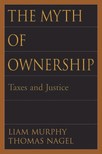228 pages
Langue : English
Publié 8 août 2005 par Oxford University Press.

228 pages
Langue : English
Publié 8 août 2005 par Oxford University Press.
In a capitalist economy, taxes are the most significant instrument by which the political system can put into practice a conception of economic justice. But conventional ideas about what constitutes tax fairness--found in the vigorous debates about tax policy going on in political and public policy circles, in economics and law--are misguided. In particular, the emphasis on distributing the tax burden relative to pretax income is a fundamental mistake. Taxation does not take from people what they already own. Property rights are the product of a set of laws and conventions, of which the tax system forms a central part, so the fairness of taxes can’t be evaluated by their impact on preexisting entitlements. Pretax income has no independent moral significance. Standards of justice should be applied not to the distribution of tax burdens but to the operation and results of the entire framework of economic institutions. The result is …
In a capitalist economy, taxes are the most significant instrument by which the political system can put into practice a conception of economic justice. But conventional ideas about what constitutes tax fairness--found in the vigorous debates about tax policy going on in political and public policy circles, in economics and law--are misguided. In particular, the emphasis on distributing the tax burden relative to pretax income is a fundamental mistake. Taxation does not take from people what they already own. Property rights are the product of a set of laws and conventions, of which the tax system forms a central part, so the fairness of taxes can’t be evaluated by their impact on preexisting entitlements. Pretax income has no independent moral significance. Standards of justice should be applied not to the distribution of tax burdens but to the operation and results of the entire framework of economic institutions. The result is an entirely different understanding of a host of controversial issues, such as the estate tax, the tax treatment of marriage, “flat” versus progressive taxes, consumption versus income taxes, tax cuts for the wealthy, and negative income taxes for the poor.